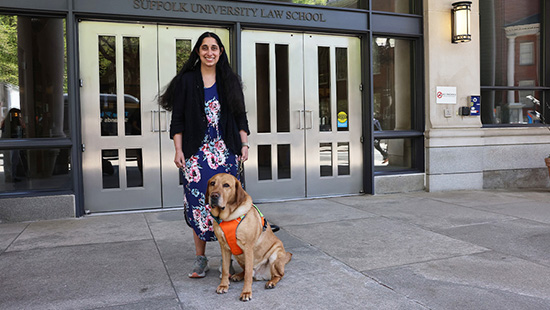First, Find the Sidewalk

After navigating their way through Suffolk Law with distinction, Rebecca Arrowood, who is legally blind, and her guide dog, Bud, are bound for Ropes & Gray.
On her way to her first day of school at Suffolk Law, Rebecca Arrowood, a legally blind 1L student, entered the fray of a typical rush hour-morning in downtown Boston accompanied by her guide dog Bud. However, her dry run a few days before to get a mental map of the route proved useless when the Green Line subway broke down and was replaced by a bus.
“It felt like the bus stopped in the middle of the street,” the 37-year-old says. Gathering her wits, she relied on verbal Google Maps directions through her earbuds and followed the flow of strangers. “I just need to figure out where the sidewalk is,” she remembers thinking, her fingers gripping the handle of Bud’s harness.
During orientation, Arrowood arrived early and sat in the front row where she could tuck Bud under the desk. She could make out the outlines of a few students in the next row, so she took a chance and turned around to introduce herself. Through that spontaneous decision, she formed close friendships that continue today, she says.
Fellow students recall Bud’s notorious snoring during classes. “Everyone kept looking around trying to figure out who fell asleep on day one,” Arrowood recalls. “What kind of person shows up to orientation and sleeps?” It was just Bud, earning his unofficial title as “No. 1 in the Class of 2025” by attending every lecture.
Growing up in Neenah, Wisconsin, about 40 miles southwest of Green Bay, Arrowood didn’t initially imagine law school in her future. In elementary school, teachers misinterpreted her visual impairment, placing her in remedial reading classes. Her mother used copy machines to enlarge text and math problems. “I don’t think I was able to hit my potential,” Arrowood says of her public-school years. “We struggled to figure out accommodations.”
Years of adapting to her visual impairment have given the first-generation college student some special abilities—she can process audio at approximately 700 words per minute, a whirlwind pace that an average person can’t match.
Ann Santos, dean of law and graduate student affairs, helped ensure Arrowood had necessary accommodations, including screen-reading software. Professors were patient in answering her many questions after class, she says, and one meticulously provided audio feedback on her writing. “Dean Santos has been instrumental,” Arrowood says. “She’s always asking, ‘What do you need to be effective here?’”
Success for Arrowood has been much less elusive than a functional Green Line. With Suffolk’s help, she secured internships with the Supreme Judicial Court of Massachusetts and the general counsel’s office of the US Department of Veterans Affairs.
Arrowood, who will graduate in the top ten percent of her class, will begin working this fall as an associate at Ropes & Gray, one of the nation’s elite law firms. After settling in, she hopes to join the firm’s asset management group. Suffolk Law’s Office of Professional & Career Development helped her strategize for interviews, she says, allowing her to better explain the relevance of her eclectic background—before law school she worked as a mental health and substance abuse counselor and as a recruiter of military family life counselors, among other jobs.
When she joins Ropes & Gray this fall, she won’t just be starting a new career—she’ll be challenging her peers to reconsider what’s possible.



